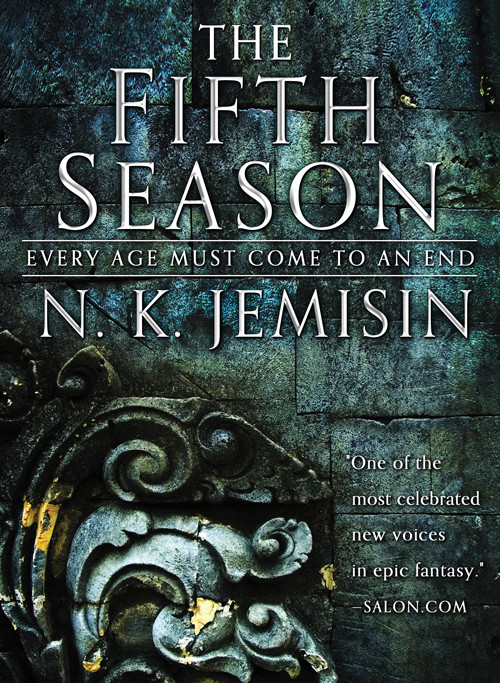
The Fifth Season
By N. K. Jemisin
Published 2015 by Orbit
ISBN 978-0-356-50819-1
Winner: Hugo Award for Best Novel, 2016
You are she. She is you. You are Essun. Remember? The woman whose son is dead.
You're an orogene who's been living in the little nothing town of Tirimo for ten years. Only three people here know what you are, and two of them you gave birth to.
Well. One left who knows, now.
That is certainly one way to kick off a story.
Essun and everyone else lives on a planet consisting of a single giant continent stretching from pole to pole. Due to extreme geological instability human technological progress is currently limited due to frequent and prolonged ecological disasters. There is evidence everywhere of very advanced civilizations in the distant past but all seem to have eventually succumbed to the churning earth.
Some humans are orogenes, possessing the ability to control the earth using only their thoughts. Everyone else considers orogeney to be a terrifying mutation despite its apparent usefulness; orogenes are taken against their will at a young age to be trained how to use their powers and their movements are strictly proscribed.
The Fifth Season has a very deliberately complicated structure, following three main characters at different times in a way that illuminates the larger world as the protagonists strive with their own little problems. This is by no mean unique to this book, but Jemisin is a clever enough writer to make it seem fresh. Little details in one plot line are revealed at just the right time to make part of another character's journey make sense. I am a sucker for books with "aha, now I get it" moments, The Fifth Season is full of them.
I have heard the complaint that The Fifth Season is hard to get into and I can see why. The book opens straight into a world with its own argot and rules, the reader has no choice but to blindly follow the characters' journeys as best they can. But Jemisin performs the neat trick of gradually revealing enough so that the reader eventually knows or suspects things that even the protagonists are unaware of. It has been a long time since a book drew me in so completely.
Some people might also be put off by the use of 2nd person point of view in the present tense. Parts of the book are written this way and it is a startling techniqueI almost expected the book to ask me to turn to page 34 if I chose to fight the orc. The Fifth Season bounces around tenses and timelines constantly in an initially confusing way but once I got over the shock I found it completely appropriate for the story Jemisin is trying to tell and everything becomes clear.
The nearest analogue I can think of to The Fifth Season is some of Ursula K. Le Guin's novels. It has the same kind of strong world building element holding up an exciting plot with relatable and flawedVery, very flawed characters. Also present is the sense of social commentary - the characters are shaped not just by geological forces but by the structure of the society in which they live. Orogenes can control the former but are almost powerless against the weight of history and policy.
Like Le Guin's work, all this is probably intended as a commentary on modern race, class, and gender relations. But don't worry, The Fifth Season is not in the business of hammering home these themes in tedious allegory. The races and cultures in the book may not map easily onto our world but much of what is wrong with that world's society is applicable to today's landscape, and we don't have the excuse of a world ending cataclysm every few hundred years.
Anyway, The Broken Earth won a Hugo. This is not always a sign that a book is worth reading but in this case it most certainly is. Highly recommended.